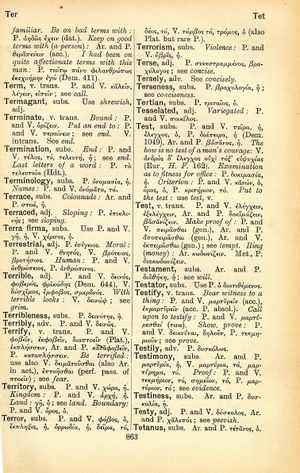tetanus: Difference between revisions
From LSJ
Δελφῖνα νήχεσθαι διδάσκεις: ἐπὶ τῶν ἐν ἐκείνοις τινὰ παιδοτριβούντων, ἐν οἷς ἤσκηται → Teaching dolphins to swim: is applied to those who are teaching something among people who are already well versed in it
(3) |
m (Woodhouse1 replacement) |
||
| Line 1: | Line 1: | ||
{{Woodhouse1 | {{Woodhouse1 | ||
|Text=[[File:woodhouse_863.jpg|thumb|link={{filepath:woodhouse_863.jpg}}]] | |Text=[[File:woodhouse_863.jpg|thumb|link={{filepath:woodhouse_863.jpg}}]] | ||
===substantive=== | |||
Ar. and P. [[τέτανος]], ὁ. | [[Aristophanes|Ar.]] and [[prose|P.]] [[τέτανος]], ὁ. | ||
}} | }} | ||
{{Lewis | {{Lewis | ||
Revision as of 09:23, 20 May 2020
English > Greek (Woodhouse)
substantive
Latin > English (Lewis & Short)
tĕtănus: i, m., = τέτανος,>
I a stiffness or spasm of the neck, tetanus, Plin. 23, 1, 24, § 48; 31, 10, 46, § 122; Scrib. Comp. 101 (in Cels. 4, 3, written as Greek).
Latin > French (Gaffiot 2016)
tĕtănus, ī, m. (τέτανος), contraction des nerfs, crampe, tétanos : Plin. 23, 48 ; 31, 122.
Latin > German (Georges)
tetanus, ī, m. (τέτανος), die Halsstarre, der Tetanus, Plin. u. Scrib. – Dav. tetanicus, a, um (τετανικός), mit der Halsstarre behaftet, Plin. 20, 239 u.a.
Latin > English
tetanus tetani N M :: neck-cramp (Pliny)

